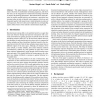1233 search results - page 126 / 247 » Feudal Reinforcement Learning |
ECAI
2006
Springer
13 years 11 months ago
2006
Springer
Abstract. This paper proposes a novel approach to discover options in the form of conditionally terminating sequences, and shows how they can be integrated into reinforcement learn...
GECCO
2006
Springer
13 years 11 months ago
2006
Springer
Both genetic algorithms (GAs) and temporal difference (TD) methods have proven effective at solving reinforcement learning (RL) problems. However, since few rigorous empirical com...
IAT
2008
IEEE
13 years 8 months ago
2008
IEEE
TD-FALCON (Temporal Difference - Fusion Architecture for Learning, COgnition, and Navigation) is a class of self-organizing neural networks that incorporates Temporal Difference (...
ESANN
2007
13 years 9 months ago
2007
The eligibility trace is one of the most used mechanisms to speed up reinforcement learning. Earlier reported experiments seem to indicate that replacing eligibility traces would p...
IWANN
1999
Springer
14 years 10 days ago
1999
Springer
To avoid the curse of dimensionality, function approximators are used in reinforcement learning to learn value functions for individual states. In order to make better use of comp...


